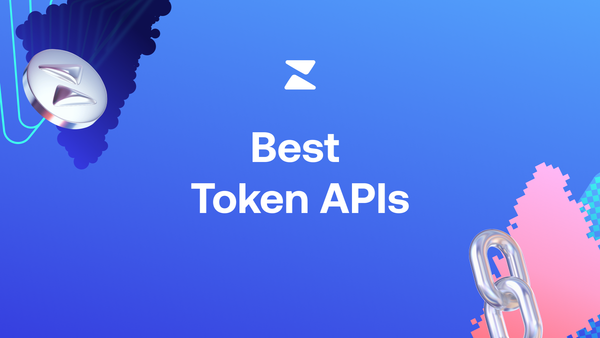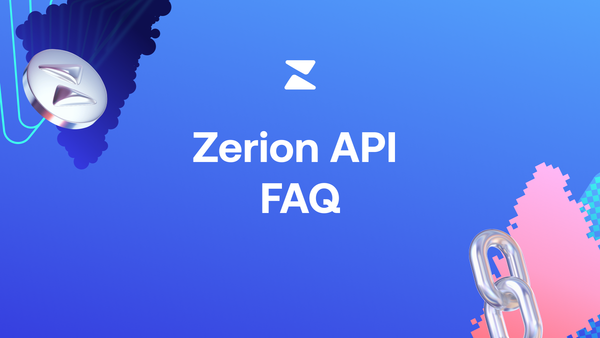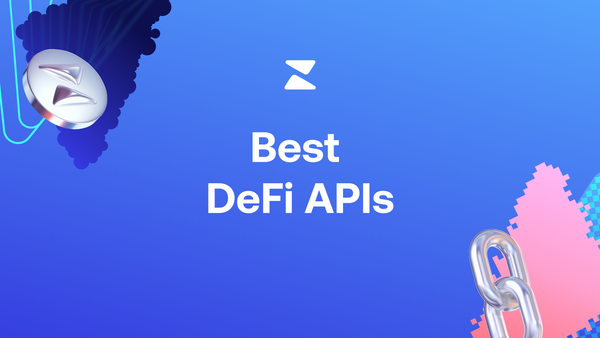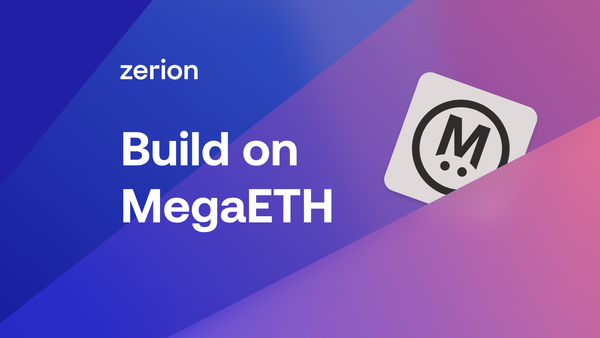Moralis vs Zerion API: A Comprehensive Comparison
In this guide, we’ll break down the differences between Zerion API and Moralis across capabilities, performance, chain support, pricing, and ideal use cases.
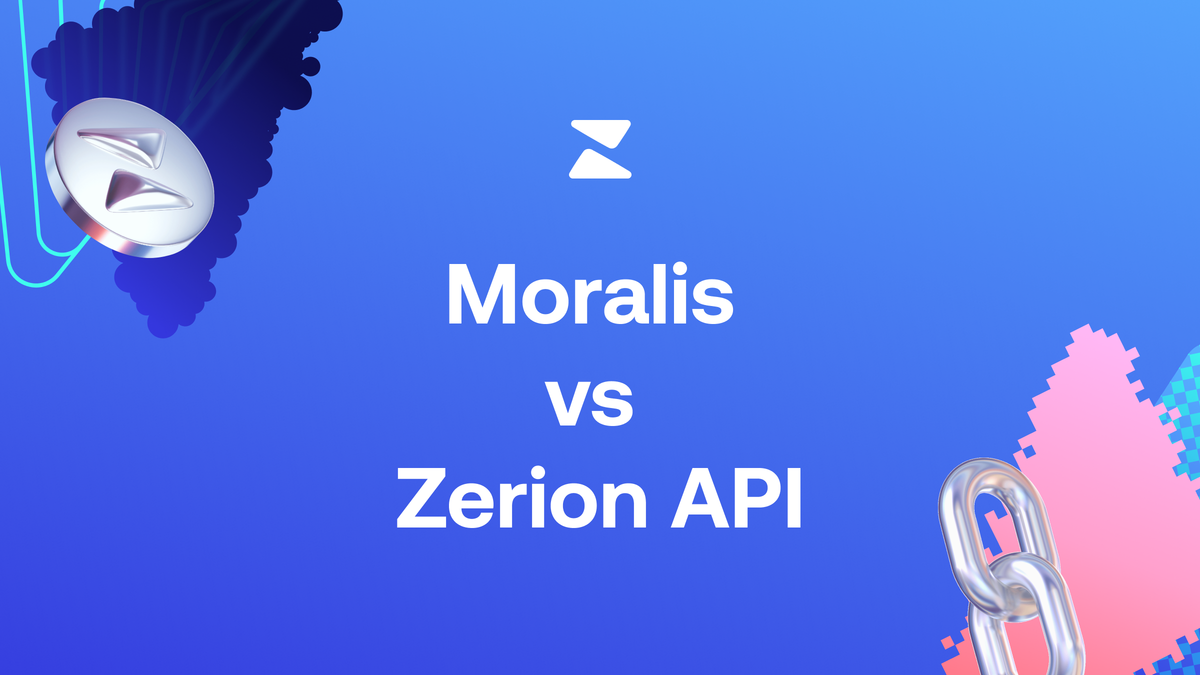
As crypto apps grow more sophisticated, so do their data needs. Wallets, tax tools, embedded wallets, agent platforms, and DeFi apps all rely on blockchain data platforms to power key product experiences: token discovery, real-time balances, transaction history, DeFi positions, and more.
Two names often compared are Moralis and Zerion API. While Moralis emerged early as a broad blockchain data provider, Zerion API was built later with a more specific purpose: to deliver ready-to-use wallet data that powers consumer-grade UX with minimal overhead. This distinction shapes everything from performance to pricing to integration effort.
In this guide, we’ll break down the differences across capabilities, performance, chain support, pricing, and ideal use cases.
Introduction to blockchain data platforms
Blockchain data platforms originally emerged to simplify node access.
Instead of running your own infrastructure, providers like Moralis, Alchemy, and others offer node APIs so teams can query raw blockchain data without maintaining full nodes.
Over time, these platforms expanded into indexing, multi-chain support, and higher-level abstractions. Moralis positioned itself early as a developer-friendly alternative to nodes, offering APIs for events, balances, NFTs, and more.
Zerion—initially a wallet and portfolio product—took a different path. After years of running its own indexing infrastructure to serve millions of users, Zerion packaged that internal technology into the Zerion API. This API focuses on interpreted, human-readable wallet data rather than raw blockchain infrastructure.
This difference—raw data vs interpreted wallet data—defines much of the comparison between the two.
Core functions of blockchain data platforms
Although Moralis and Zerion API both provide multi-chain data, they serve different purposes within the broader blockchain data stack.
Node provision and management
- Moralis: Historically offered node services and broad blockchain data access. Developers can fetch events, logs, and run low-level queries per chain.
- Zerion API: Does not provide nodes. Instead, it only offers high-level wallet intelligence—balances, tokens, NFTs, PnL, transactions—abstracted across chains.
API accessibility and integration capabilities
- Moralis: Requires separate queries for each blockchain and each data type. Some teams make 10+ calls per wallet to complete a single refresh cycle. Costs can quickly add up.
- Zerion API: Built for fast onboarding and simplified integration. Teams fetch all tokens, NFTs, and positions across all chains in a single call.
Developer tools and resources
- Moralis: Broad documentation with tutorials across many developer use cases (nodes, logs, events, etc.). Even newbies can quickly get up to speed and build popular use cases, such as a crypto trading bot or a DEX frontend.
- Zerion API: Designed for consumer products—wallet PMs, embedded wallets, tax tools, AI agents—prioritizing predictable schemas, normalization, and interpreted data. The API is intentionally compact and minimal, reducing engineering overhead. This aligns with Zerion’s developers, who require one surface across EVM and Solana.
Infrastructure reliability and performance metrics
- Moralis: Node performance is first class. But performance in the actual app depends on chain-by-chain architecture and multi-call workflows.
- Zerion API: Built to serve millions of Zerion Wallet users. Known for fast response times and scalable RPS. Supports enterprise workloads of up 2,000 RPS.
Technical capabilities and infrastructure
Zerion API
Zerion API focuses on ready-to-use wallet data, eliminating the need to interpret raw blockchain logs yourself. The API provides:
- All balances, tokens, NFTs, and DeFi positions in one normalized response.
- Real-time & historical data across all major EVM chains + Solana, with consistent schemas.
- Single endpoint for positions across chains.
- Built-in fiat values, PnL metrics, and metadata that consumer apps expect.
Because the API was developed originally for Zerion Wallet itself, the data is human-readable, normalized, and optimized for UX. This dramatically reduces engineering time compared to stitching together raw node data.
Moralis
Moralis was built as a broad blockchain development platform, offering access to raw blockchain data, APIs for events and logs, and tools that resemble node-as-a-service providers. Its infrastructure is flexible and covers many chain-specific needs, but this comes with trade-offs in complexity and performance.
- Chain-by-chain queries. Moralis typically requires separate calls for each chain. Teams needing balances, assets, and chain coverage often send multiple sequential queries—sometimes up to 10 calls per wallet refresh—which slows down UX and increases compute usage. This overhead is especially painful for consumer wallets or apps with many user addresses.
- Limited DeFi positions support. Moralis offers broad data access, but its support for interpreted DeFi positions is often described as “limited,” meaning teams often must build their own indexing or interpretation logic on top of raw token data.
- Complex integration model. Because developers must fetch each data type (assets, balances, NFTs, events) separately—and for each chain—integrations require more engineering time and more maintenance. Mismatch across chains can cause fragmentation and slower refresh cycles for end users.
- Flexible but infrastructure-heavy. Moralis is powerful when an app needs low-level blockchain access. But when the product is focused on address-level UX, the Moralis model requires more stitching, more reconciliation, and more dev effort.
In short: Moralis gives you raw power and flexibility, but expects you to build the data intelligence layer yourself.
Supported blockchains
Moralis
Moralis offers extensive multi-chain support, but many chains require separate queries and have inconsistent data structures. Support for DeFi positions is more limited, according to documentation.
Zerion
Zerion API supports all major EVM chains and Solana, all behind a single schema. No separate vendor is needed for Solana.
Pricing
Moralis
Subscription plans (from $49 to $490 per month) include different numbers of CUs, which are spent on nodes and data APIs.
Because Moralis requires many separate calls, high-volume teams can face unpredictable expenses.
Zerion API
Zerion offers transparent, predictable pricing, based on request volume rather than per-wallet refreshes:
- Free tier available
- $149/month for up to 250,000 requests
- $499/month for up to 1 million requests
Zerion’s single-call architecture makes costs predictable even at large scale. For example, Safary, which shows onchain analytics for millions of wallet addresses, found Zerion API reliable and predictable.
How to choose
The choice comes down to what your product needs:
- If you want broad access to raw blockchain data, event logs, and node-like functionality, Moralis remains a flexible general-purpose platform.
- But if you're building a wallet, portfolio tracker, tax tool, DeFi interface, agent app, or any product that needs interpreted wallet data, then Zerion API is the faster, simpler, and more scalable choice.
If you want to easily:
- Add wallet balances, tokens, NFTs, and DeFi positions to an app
- Reduce engineering time
- Improve UX and activation
- Support EVM + Solana without multiple vendors
- Keep pricing predictable
…then Zerion API is the better fit. Get your free dev key and try it now.


